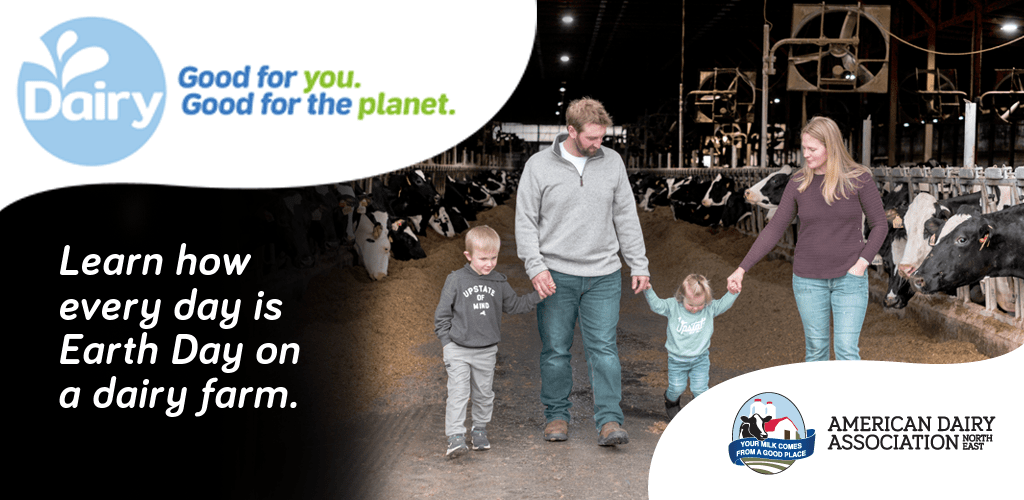
SYRACUSE, NY – April 22, 2024 – Earth Day is celebrated every year on April 22 to raise awareness and educate people about the need to protect our natural resources—land, water, and air—for future generations.
While Earth Day is a reminder for millions of Americans to plant a tree, start a garden, or recycle, for Northeast dairy farmers “Every Day is Earth Day” as they care for their cows and the land to produce a sustainable product that is good for you and good for the planet.
The U.S. dairy industry works hard to protect the planet. Sustainable practices have come a long way on dairy farms, resulting in less greenhouse gas emissions, new ways to recycle water, and less energy spent to produce the milk you drink.
There are many ways dairy farmers incorporate sustainable practices each day that most people never consider when they reach for a glass of milk, add cheese to their recipe or eat a spoonful of yogurt.
Dairy Farming Fights Climate Change and Reduces Greenhouse Gasses
The latest research shows that the U.S. dairy industry accounts for only about 2 percent of U.S. greenhouse gas emissions. Some dairy farmers use methane digesters that work to capture the methane produced on farms and convert it to renewable natural gas, which decreases greenhouse gas emissions. Cow manure is converted into energy that can heat and power farms, as well as nearby homes. On some farms, food waste from grocery stores, restaurants and other institutions is also added to digesters which decreases greenhouse gas emissions while diverting tons of food waste from landfills.
Dairy farmers also reduce greenhouse gas emissions by feeding cows byproducts from other industries, like spent grains, which would otherwise be thrown in a landfill. Scientists are investigating new changes to a cow’s diet like adding starches and seaweed that have shown encouraging reductions in the amount of methane they emit.
Dairy Farmers Recycle Water and Protect Waterways
Reusing and recycling water is a standard practice on many of today’s dairy farms. On average, water is recycled up to four times to cover uses from chilling the actual milk produced to providing drinking water for cows, to cleaning of stalls and irrigation of crops.
From lakes and streams to larger bodies of water, dairy farms that border our waterways work with environmental groups, government agencies, and other partners to improve water quality and ensure environmental conservation compliance. Preventing soil erosion is accomplished by farmers through a variety of techniques including no-till farming and cover crop planting. Both practices improve soil health, enhance water infiltration and reduce surface runoff.
Dairy farmers also plant riparian buffers along waterways—a proactive and environmentally responsible practice that helps protect water quality. Trees help stabilize the soil along waterways and prevent erosion caused by water runoff by acting as natural filters, trapping sediment, nutrients, and pollutants before they reach the water. Trees also create habitats for various wildlife species, including birds, insects, and small mammals. These diverse ecosystems contribute to biological pest control and pollination services, reducing the need for synthetic pesticides and enhancing crop yields.
Dairy Products are Part of a Sustainable Food System
Considering all of the efforts dairy farmers are making to produce nutritious milk while minimizing their environmental impacts, consumers can be assured that their dairy products are part of a sustainable food system.
But what exactly is sustainable nutrition?
Simply put, sustainable nutrition is the ongoing science-based pursuit to provide affordable, accessible, nutrient-rich foods to feed the world’s growing population while protecting our environmental resources now and for future generations.
Dairy foods provide nearly 20 percent of the protein in American diets and more than 50 percent of our calcium and vitamin D but are only responsible for two percent of the U.S. carbon footprint. And at only 27 cents per 8-ounce glass, milk is amazingly affordable.
Dairy: Good for You, Good for the Planet
Dairy farmers take pride in protecting the land, caring for their animals and producing a high-quality product. By following environmentally friendly practices, dairy farmers are able to minimize their impact on their land and the environment. Not just on Earth Day, but every day.
